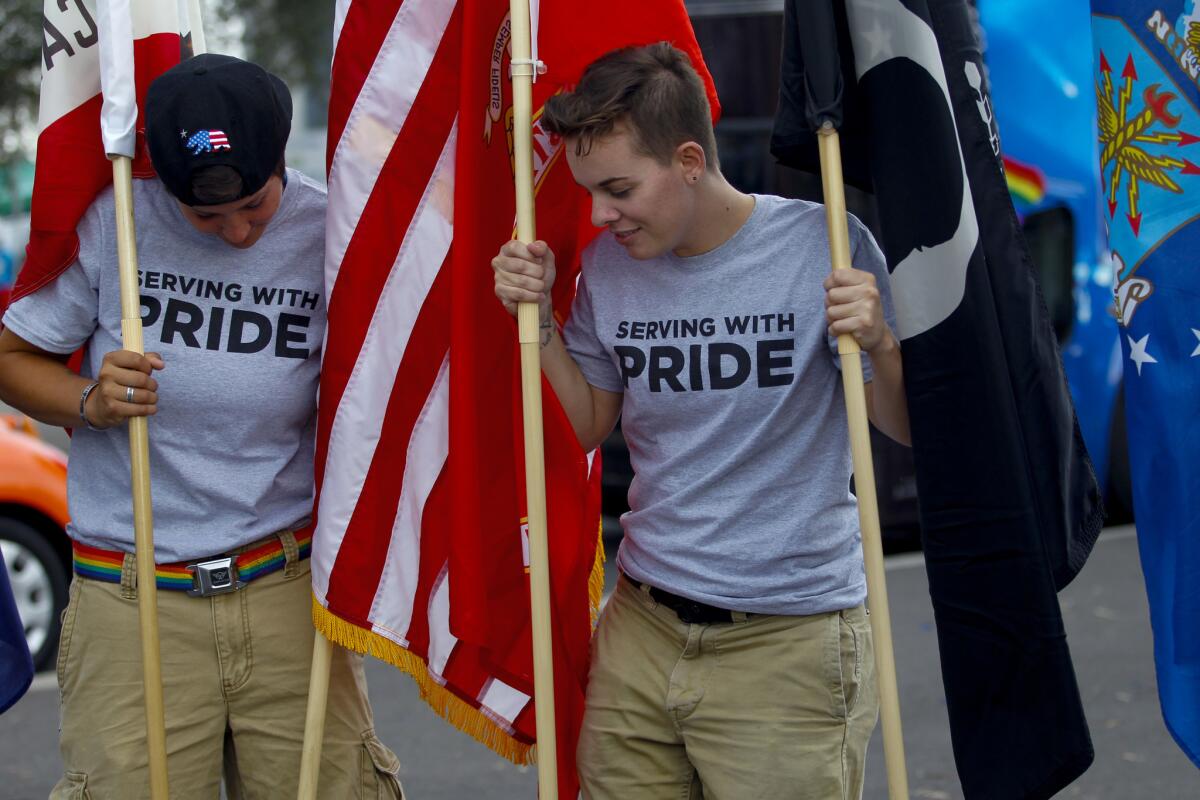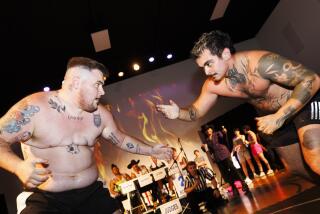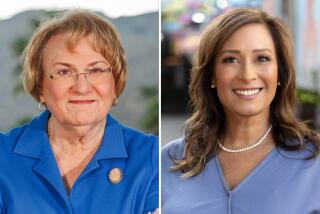San Diego Pride Parade celebrates military’s plan for transgender troops

Shelbi Fogel, left, and Katrina Desserith wait for the start of the San Diego Pride parade. Fogel is a corporal in the U.S. Marines and Desserith is a Marine veteran.
Reporting from San Diego — In a drenching rain, Evander Deocariza, an active-duty Marine, was the flag bearer Saturday for the transgender community flag in the color guard for the city’s 41st LGBT Pride Parade.
By sheer coincidence, the San Diego parade was the same week that Secretary of Defense Ash Carter announced formation of a six-month working group to study “policy and readiness implications” of “welcoming” transgender people to serve openly. Carter’s implication was clear: Make it happen.
Once Carter made his announcement, Deocariza knew what he had to do. He announced to his command, where he is known by a different name, that he is transgender. And he decided to go public at one of the nation’s largest pride parades.
Deocariza, 25, a corporal, wore a T-shirt with the slogan “Serving With Pride” and a button reading “Trans and Proud.” His girlfriend, a civilian, marched along with several hundred military personnel as the crowd lining the streets of Hillcrest cheered.
“I want to set an example of what a transgender person can be like — a good Marine,” said Deocariza, a linguist.
Weeks ago parade organizers had decided to feature the transgender community as the collective grand marshal, under the slogan “Liberty and Justice For All.” Still, Carter’s announcement was a surprise.
“I never thought I’d see the day when the secretary of Defense would make sure that other transgender people aren’t denied the right to serve, like I was,” said Katerina du Lac, 33, who said she was discharged from the Navy after announcing she was transgender.
She said that Carter acknowledged the pain faced by transgender people not allowed to serve openly.
“We have transgender soldiers, sailors, airmen and Marines — real, patriotic Americans — who I know are being hurt by an outdated, confusing, inconsistent approach that’s contrary to our value of service and individual merit,” Carter said in his announcement Monday.
Nic Coffman, 33, a graphic designer whose spouse is an active-duty Marine, said the announcement “brought tears to my eyes. We’ve had a lot of firsts in the past five years.”
As the U.S. military’s policy toward gays and lesbians has evolved, the annual LGBT Pride Parade in San Diego, as befits a military community, has been in the forefront.
In 2011, with the “don’t ask, don’t tell” rule still in effect, upward of 200 military personnel marched defiantly in the San Diego parade, many wearing T-shirts identifying their branch of the service.
In 2012, after the policy was repealed, the Pentagon issued a one-year exemption to the rule banning the wearing of uniforms in the parade just days before the San Diego event. Several hundred military personnel marched, some in uniform, others in T-shirts.
Now that the no-uniforms rule has been lifted permanently, the number of military personnel, active-duty and retired, in the San Diego parade has grown each year, many from local bases, others from bases around the country. Saturday’s contingent was estimated at more than 300.
San Diego Councilman Todd Gloria, who is gay, said that while he is pleased with changes made by the Department of Defense, there are still challenges facing the transgender community. “It isn’t time for a ‘Mission Accomplished’ banner,” he said.
Several activists staged “die-ins” along the parade route to emphasize the need for continued political action involving transgender issues, including spousal rights, health care, protection from violence, nondiscrimination in employment and housing, and overall public acceptance.
“There is still work to be done, but it’s great that the Department of Defense is willing to do some of that work,” said Assembly Speaker Toni Atkins (D-San Diego), who marched in the parade with her spouse.
If the Department of Defense is pondering how to “welcome” transgender military personnel to serve openly, the California Military Reserve, which supports the California National Guard, has already concluded that it can be done, military officials said.
On Friday, Maj. Gen. David Baldwin, adjutant general of the California National Guard, noted that the state’s Military Reserve has been welcoming transgender soldiers since 2014 “without adverse impact to military capability and readiness.”
In some areas, acceptance may be gradual.
“My command took it well,” said Marine Cpl. Heather Stuck, 29, who is married to Coffman. “But we heard whispers in the neighborhood so we decided to move off base.”
Clay Kilpatrick, 50, who is gay and helps organize the parade each year, said he does not see any major problems once the working group organized by Carter finishes its work and transgender personnel can serve openly. Kilpatrick served eight years as a Marine, including as a drill instructor.
“Once Marines are given an order, they carry it out,” he said. “It will be a transition for some people to get used to but they will. They’re Marines.”
More to Read
Sign up for Essential California
The most important California stories and recommendations in your inbox every morning.
You may occasionally receive promotional content from the Los Angeles Times.










